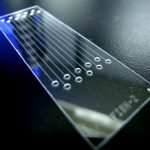 The capabilities of ‘labs on a chip’ have been steadily growing for a few years now, and the latest evidence of this growth comes via a recently published paper from Rutgers University-New Brunswick.
The capabilities of ‘labs on a chip’ have been steadily growing for a few years now, and the latest evidence of this growth comes via a recently published paper from Rutgers University-New Brunswick.
The team have developed technology that they believe could easily be used in hand-held or wearable devices to monitor our health and exposure to a range of things, from bacteria and viruses to pollution.
“This is really important in the context of personalized medicine or personalized health monitoring,” the team say. “Our technology enables true labs on chips. We’re talking about platforms the size of a USB flash drive or something that can be integrated onto an Apple Watch, for example, or a Fitbit.”
The team believe that such a device could be on the market within a few years, with more complex health monitoring and diagnostic tools available in around five.
Barcoding microparticles
The technology works by electronically barcoding microparticles to allow for their identification. It allows for testing to be undertaken for a range of health and disease indicators, as well as for bacteria, viruses and contaminants in the air.
At the heart of the project is a growing understanding of biomarkers that help to reveal the complex nature of human disease, and therefore the importance of testing for numerous biomarkers at the same time.
“One biomarker is often insufficient to pinpoint a specific disease because of the heterogeneous nature of various types of diseases, such as heart disease, cancer and inflammatory disease,” the researchers say. “To get an accurate diagnosis and accurate management of various health conditions, you need to be able to analyze multiple biomarkers at the same time.”
The traditional method for hunting for biomarkers consists of bulky optical instruments, but such devices are obviously difficult to add to any personal, portable device.
The detection of microparticles via electronic means allows for instruments to be shrunk down to the kind of size needed to fit into wearable devices. The barcoding approach is the first of its kind to be fully electronic, thus allowing biosensors to be a suitable size for wearable bands.
Despite being very compact, the sensors are nonetheless very accurate, with the team reporting 95% accuracy rates in identifying biomarkers, with further tuning underway to improve this to 100% accuracy. They’re also developing the device so that it can detect microrganisms such as bacteria and viruses.
“Imagine a small tool that could analyze a swab sample of what’s on the doorknob of a bathroom or front door and detect influenza or a wide array of other virus particles,” they say. “Imagine ordering a salad at a restaurant and testing it for E. coli or Salmonella bacteria.”
Whilst the technology is a little way off reaching the market, it’s an exciting glimpse into where wearable tech will surely go.